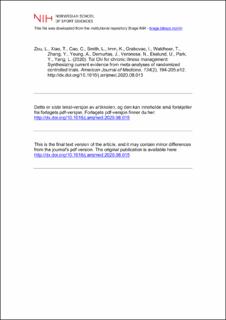| dc.contributor.author | Zou, Liye | |
| dc.contributor.author | Xiao, Tao | |
| dc.contributor.author | Cao, Chao | |
| dc.contributor.author | Smith, Lee | |
| dc.contributor.author | Imm, Kellie | |
| dc.contributor.author | Grabovac, Igor | |
| dc.contributor.author | Waldhoer, Thomas | |
| dc.contributor.author | Zhang, Yin | |
| dc.contributor.author | Yeung, Albert | |
| dc.contributor.author | Demurtas, Jacopo | |
| dc.contributor.author | Veronese, Nicola | |
| dc.contributor.author | Ekelund, Ulf | |
| dc.contributor.author | Park, Yikyung | |
| dc.contributor.author | Yang, Lin | |
| dc.date.accessioned | 2021-09-01T12:53:51Z | |
| dc.date.available | 2021-09-01T12:53:51Z | |
| dc.date.created | 2020-11-13T13:07:22Z | |
| dc.date.issued | 2020 | |
| dc.identifier.citation | American Journal of Medicine. 2020, 132(2), 194-205. | en_US |
| dc.identifier.issn | 0002-9343 | |
| dc.identifier.uri | https://hdl.handle.net/11250/2772281 | |
| dc.description | Dette er siste tekst-versjon av artikkelen, og den kan inneholde små forskjeller fra forlagets pdf-versjon. Forlagets pdf-versjon finner du her: https://doi.org/10.1016/j.amjmed.2020.08.015 / This is the final text version of the article, and it may contain minor differences from the journal's pdf version. The original publication is available here: https://doi.org/10.1016/j.amjmed.2020.08.015 | en_US |
| dc.description.abstract | An umbrella review of systematic reviews and meta-analyses of randomized controlled trials (RCTs) was conducted to evaluate the existing evidence of Tai Chi as a mind-body exercise for chronic illness management. MEDLINE/PubMed and Embase databases were searched from inception until March 31, 2019, for meta-analyses of at least two RCTs that investigated health outcomes associated with Tai Chi intervention. Evidence of significant outcomes (P value < 0.05) was assessed using the Grading of Recommendations Assessment, Development and Evaluation (GRADE) system. This review identified 45 meta-analyses of RCTs and calculated 142 summary estimates among adults living with 16 types of chronic illnesses. Statistically significant results (P value < 0.05) were identified for 81 of the 142 outcomes (57.0%), of which 45 estimates presenting 30 unique outcomes across 14 chronic illnesses were supported by high (n = 1) or moderate (n = 44) evidence. Moderate evidence suggests that Tai Chi intervention improved physical functions and disease-specific outcomes compared with nonactive controls and improved cardiorespiratory fitness compared with active controls among adults with diverse chronic illnesses. Between-study heterogeneity and publication bias were observed in some meta-analyses. | en_US |
| dc.language.iso | eng | en_US |
| dc.subject | chronic illness | en_US |
| dc.subject | mind-body exercise | en_US |
| dc.subject | randomized controlled trial | en_US |
| dc.subject | tai chi | en_US |
| dc.subject | umbrella review | en_US |
| dc.title | Tai Chi for chronic illness management: Synthesizing current evidence from meta-analyses of randomized controlled trials | en_US |
| dc.type | Peer reviewed | en_US |
| dc.type | Journal article | en_US |
| dc.description.version | acceptedVersion | en_US |
| dc.source.pagenumber | 194-205 | en_US |
| dc.source.volume | 132 | en_US |
| dc.source.journal | American Journal of Medicine | en_US |
| dc.source.issue | 2 | en_US |
| dc.identifier.doi | 10.1016/j.amjmed.2020.08.015 | |
| dc.identifier.cristin | 1847740 | |
| dc.description.localcode | Institutt for idrettsmedisinske fag / Department of Sports Medicine | en_US |
| cristin.ispublished | true | |
| cristin.fulltext | postprint | |
| cristin.qualitycode | 2 | |
